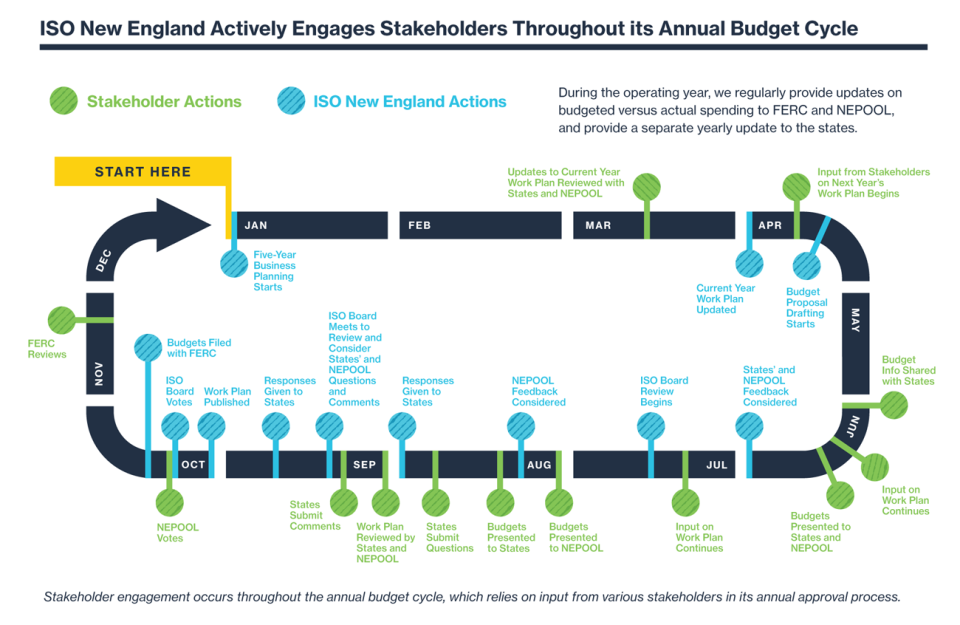NH energy officials slam ISO New England’s proposed budget

Targeting “significant cost increases attributed to the clean energy transition and environmental justice policies legislated by other states,” New Hampshire energy officials knocked ISO New England in a letter last week over the regional grid operator’s proposed budget for 2024-2025.
Signed by Department of Energy Commissioner Jared Chicoine, Consumer Advocate Donald Kreis, and all three members of the Public Utilities Commission, the Sept. 6 letter took aim at the preliminary budget ISO New England is seeking feedback on from all six New England states.
The New Hampshire energy officials cited a 21.5 percent increase in the not-for-profit entity’s revenue requirement, more than half of which, they said, is driven by salary and bonus increases.
They went on to single out costs associated with clean energy and environmental justice goals of the other New England states. Chicoine, Kreis, and the PUC said these are “clear examples of costs shifting to New Hampshire residents” that fall outside of ISO’s mandate as a regional grid operator.
The letter questioned 35 full-time jobs “being devoted to the so-called grid of the future, when what we really need is a reliable, affordable system today.”
https://www.energy.nh.gov/sites/g/files/ehbemt551/files/inline-documents/sonh/letter-to-iso-regarding-budget.pdf Historically, communities of color and poor neighborhoods have been most subjected to environmental harms and pollution. All New England states except New Hampshire have adopted environmental justice-related statutes, meaning the states take into account poverty, race, and English language proficiency when planning certain infrastructure.
In 2021, President Joe Biden issued Executive Order 13985, directing the federal government to revise agency policies to account for racial inequities. The Federal Energy Regulatory Commission, an independent agency that oversees ISO New England, is not required to comply with the order, but elected to voluntarily participate in the process. In April 2022, FERC developed a two-year Equity Action Plan.
In a May presentation about environmental justice in power system planning, ISO wrote that it “appreciates the importance of environmental justice.”
“We’re disappointed that our grid operator has proposed a budget misaligned with the needs of New Hampshire’s ratepayers during a time of already high energy costs and economic uncertainty for so many,” the letter from Chicoine, Kreis, and the PUC read.
According to ISO, its services cost the average New England residential electricity customer $1.12 per month in 2022, based on 750 kilowatt-hours per month usage.
Second letter in one month
The recent letter came just a few weeks after Gov. Chris Sununu and a group of Republican lawmakers sent a separate letter to ISO New England, saying they were opposed to the creation of an executive-level environmental justice position that the five other New England states have collectively advocated for. They called it a “wasteful expense.”
If created, it would be the first position of its kind created by any regional grid operator in the country.
Mireille Bejjani, co-executive director of Slingshot, a New England-wide advocacy nonprofit working toward environmental justice and the clean energy transition, said the continued pushback from New Hampshire officials is “discouraging.”
While agreeing “100 percent” with their argument about salary increases and bonuses, Bejjani disagrees strongly with their claims regarding clean energy and environmental justice.
“I think it’s interesting they close (the letter) by saying they want a responsible budget that focuses on ‘safe, reliable, and affordable energy,’ because to me, all of those words are very closely associated with the clean energy transition and environmental justice,” Bejjani said. “Environmental justice is putting affordability and reliability front and center.”
To focus solely on the electric rates of the moment is “shortsighted,” Bejjani said, “when it’s just one piece of a bigger picture.”
Asked about New Hampshire’s input in the budgeting process, ISO New England spokesman Matt Kakley said, “ISO New England’s transparent budgeting process allows for detailed examination by the New England states, stakeholders, and our federal regulator. We carefully weigh feedback from all of these parties, even if commenters express different, sometimes contradictory, points of view.”
Kakley said ISO’s board of directors takes all perspectives into account when reviewing the budget, “ensuring it strikes the appropriate balance between cost impact and the growing demands on the ISO to meet our core mission of providing the region’s 15 million residents with a reliable power system and competitive wholesale electricity markets.”
ISO must file its finalized budget with FERC for review no later than 60 days before the operating year begins. More information about the budgeting process can be viewed here: https://www.iso-ne.com/about/what-we-do/in-depth/the-iso-funding-and-budgeting-process.

This story was originally published by New Hampshire Bulletin
This article originally appeared on Portsmouth Herald: NH energy officials slam ISO New England’s proposed budget

